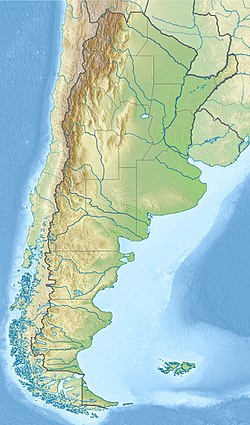Geological formation in Argentina
The Huitrera Formation is a geological formation in the Neuquén Basin in northern Patagonian Argentina whose strata date back to the Early Eocene of the Paleogene , or Casamayoran in the South American land mammal age classification.
The formation is together with the Reyhuau basalts part of the Pilcaniyeu Belt , a volcanic belt active in Paleocene to middle Eocene times.[ 1]
Description
The Huitrera Formation was first defined by Ravazzoli and Sesana in 1977. The name has been used to identify various volcaniclastic sequences, among others in the Ñirihuau fold-and-thrust belt .[ 2] mudstones and sandstones deposited in a crater lake environment . Part of the formation comprises andesites , dacitic and rhyolitic ignimbrites , volcanic breccias , tuffs and trachybasalts .[ 3]
The formation was initially described as Late Eocene to Early Oligocene , but was later dated to 54.24 ± 0.45 Ma, meaning the Huitrera Formation is Ypresian , or in the SALMA classification , Casamayoran in age.
Fossil content
The following macrofossils were reported from the formation:[ 4]
The formation has also provided many pollen , analyzed in 2003 by Melendi et al.[ 12]
See also
References
^ Fernández Paz et al., 2020
^ Escosteguy & Franchi, 2010, p.420
^ Prez & Massafero, 2013, p.228
^ Huitrera Formation at Fossilworks .org^ Degrange, F. J.; Pol, D.; Puerta, P.; Wilf, P. (2021). "Unexpected larger distribution of Paleogene stem-rollers (Aves, Coracii): new evidence from the Eocene of Patagonia, Argentina" . Scientific Reports . 11 (1): Article number 1363. Bibcode :2021NatSR..11.1363D . doi :10.1038/s41598-020-80479-8 . PMC 7809110 PMID 33446824 . ^ Báez & Pugener, 2003
^ Aranciaga et al., 2019
^ Jin et al., 2020
^ Ramírez et al., 2016
^ Jud et al., 2018
^ Barrera et al., 2012
^ Melendi et al., 2003
Bibliography
Fernández Paz, Lucía; Iannelli, Sofía B.; Echaurren, Andrés; Ramos, Miguel; Bechis, Florencia; Litvak, Vanesa D.; Encinas, Alfonso; Kasemann, Simone; Lucassen, Friedrich; Folguera, Andrés (2020). "The late Eocene–early Miocene El Maitén Belt evolution: Magmatic response to the changing subduction zone geodynamics" (PDF) . Journal of South American Earth Sciences 103 . Bibcode :2020JSAES.10302713F . doi :10.1016/j.jsames.2020.102713 . Jin, Mengjie; Zwick, Andreas; Ślipiński, Adam; Marris, John W. M.; Thomas, Michael C.; Pang, Hong (2020), "A comprehensive phylogeny of flat bark beetles (Coleoptera: Cucujidae) with a revised classification and a new South American genus", Systematic Entomology 45 (2): 248–268, Bibcode :2020SysEn..45..248J , doi :10.1111/syen.12392 Aranciaga Rolando, Alexis M.; Agnolin, Federico L.; Corsolini, Julián (2019), "A new pipoid frog (Anura, Pipimorpha) from the Paleogene of Patagonia. Paleobiogeographical implications" , Comptes Rendus Palevol 18 (7): 725–734, Bibcode :2019CRPal..18..725R , doi :10.1016/j.crpv.2019.04.003 Jud, Nathan A.; Iglesias, Ari; Wilf, Peter; Gandolfo, Maria A. (2018), "Fossil moonseeds from the Paleogene of West Gondwana (Patagonia, Argentina)", American Journal of Botany 105 (5): 927–942, doi :10.1002/ajb2.1092 , hdl :11336/183708 PMID 29882954 Ramírez, Leonardo C.; Corsolini, Juan; Di Iorio, Osvaldo (2016), "First fossil record of parasitic flat-bark beetle (Coleoptera: Passandridae) from the Eocene of Patagonia, Argentina", Ameghiniana 53 (2): 160–169, doi :10.5710/AMGH.29.11.2015.2920 , hdl :11336/13059 Prez, Horacio; Massaferro, Gabriela (2013), "Geología y geomorfología del tramo superior del Arroyo Comallo, Río Negro" (PDF) , Contribuciones Científicas GÆA , 26 : 221–234, retrieved 2020-06-13 Barreda, V.D.; Palazzesi, L.; Katinas, L.; Criscri, J.V.; Telleria, M.C.; Bremer, K.; Passala, M.G.; Bechis, F.; Corsolini, R. (2012), "An extinct Eocene taxon of the daisy family (Asteraceae): evolutionary, ecological and biogeographical implications", Annals of Botany 109 (1): 127–134, doi :10.1093/aob/mcr240 , PMC 3241571 PMID 22179952 Escosteguy, Leonardo; Franchi, Mario (2010), "Estratigrafía de la región de Chapelco, Provincia del Neuquén" (PDF) , Revista de la Asociación Geológica Argentina 66 : 418–429, retrieved 2020-06-13 Báez, Ana M.; Pugener, L. Analia (2003), "Ontogeny of a new Palaeogene pipid frog from southern South America and xenopodinomorph evolution", Zoological Journal of the Linnean Society 139 (3): 439–476, doi :10.1046/j.1096-3642.2003.00085.x Melendi, D.L.; Scafati, L.H.; Volkheimer, W. (2003), "Palynostratigraphy of the Paleogene Huitrera Formation in N-W Patagonia, Argentina", Neues Jahrbuch für Geologie und Paläontologie, Abhandlungen 228 (2): 205–273, doi :10.1127/njgpa/228/2003/205

